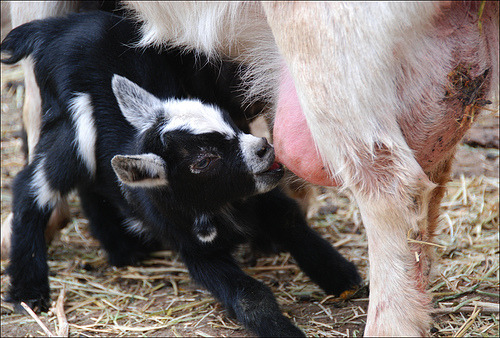Shiluach HaKen vs Lo Tivashel G'di
לֹא-תִקַּח הָאֵם, עַל-הַבָּנִים
לֹא-תְבַשֵּׁל גְּדִי, בַּחֲלֵב אִמּוֹ
Two different mitzvot in the Torah, that upon a simple reading would seem to be similar. They're both about the mother/offspring relationship in the animal kingdom, and about compassion or respect for that relationship.
Yet the former is a limited circumstance mitzvah, limited by the chachamim even further to precise conditions. But the latter controls half our lives as observant Jews.
 Imagine if Shiluach HaKen was treated like meat & milk? Imagine if we derived a vast body of laws from it the way we do with those 5 simple words about a kid and mother's milk?
Imagine if Shiluach HaKen was treated like meat & milk? Imagine if we derived a vast body of laws from it the way we do with those 5 simple words about a kid and mother's milk?We probably wouldn't be allowed to eat eggs and chicken together. And we'd have separate sets of dishes for egg products and fowl products. Or something along those lines.
Why are they so different? I know the traditional answer is that Torah SheBa'al Peh was given at Sinai, and that's the interpretation that was given at that time.
After all, the gemara is full of such source seeking - it enlessly asks "minalan"? - where do we know this from? What's the source in Torah SheBichtav? And invariably, the answer is: because pasuk x says something that might parsed in an obscure manner to provide our source. That was likely a part of our tradition well before the Mishna and the Gemara.
So what came first? The chicken or the egg? Just some food for thought.

I don't see the point of the comparison.
ReplyDeleteFirst of all, shiluach hakan shows up once in the Torah, milk and meat is mentioned thrice and always as an add on after a difference mitzvah.
Secondly, milk and meat are things we run into every day, shiluach hakan is very, very rare.
Third, what do chickens have to do with it? Shiluach hakan only applies to wild birds.
Garnel -
DeleteI'll address your points in order:
1) Yes, I know about the repetitions and the context when it comes to "lo tevashel", and the resulting interpretations. I thought that the comparison was noteworthy nontheless.
And if you are like me, a believer in a documentary composite Torah, then the repetition is accountable to being from different documents that were put together by the redactor(s).
However, that gives me a thought. There's no question that the laws regarding meat & milk are ancient. So at the time of redaction, the like of "lo tevashel" may have already been understood to refer to all ruminants and to any meat & milk, not just the mother-child relationship. Therefore, the redactor(s) may have purposely left it in 3 times, to deliberately highlight the way in which it was already understood.
2) agreed
3) That was precisely my point. "lo tevashel" is a simple line that refers only to goats. Yet it is understood to refer to any milk-giving kosher animal. In the same way, I fancifully speculated that if Shiluach Haken had been interpreted similarly, it might have been understood to refer to all birds, including the most commonly eaten one, the chicken.
> And if you are like me, a believer in a documentary composite Torah
ReplyDeleteNo, definitely not like you. I'm firmly convinced in the antiquity and unity of the text.
Read the chapter on meat and milk in Chullin. It asks your questions but gives very different answers including a very comprehensive way to understand the threefold repetition.
"you" was a form of speech, like saying "if one is like me..". I know you don't share my hashkafa
Delete